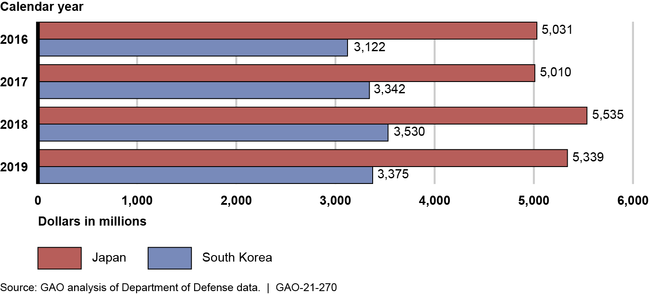Burden Sharing: Benefits and Costs Associated with the U.S. Military Presence in Japan and South Korea
Fast Facts
日本語に翻訳したコンテンツが希望のお方はこちらでご覧ください
이 페이지의 한국어 번역은 GAO-21-424 를 참고하세요
The United States has over 80,000 troops deployed in Japan and South Korea. We found that U.S. forces help strengthen alliances, promote a free and open Indo-Pacific region, provide quick response to emergencies, and are essential for U.S. national security.
The United States incurs costs to achieve these benefits. From 2016 through 2019, the Department of Defense spent roughly $20.9 billion in Japan and $13.4 billion in South Korea to pay military salaries, construct facilities, and perform maintenance. The governments of Japan and South Korea also provided $12.6 billion and $5.8 billion, respectively, to support the U.S. presence.
Marines from the Republic of Korea Train with U.S. Marines in Pohang, South Korea

Highlights
日本語に翻訳したコンテンツが希望のお方はこちらでご覧ください
이 페이지의 한국어 번역은 GAO-21-424 를 참고하세요
What GAO Found
GAO identified six benefits to U.S. national and regional security derived from the U.S. military presence in Japan and South Korea (see fig.1). U.S. officials and strategy documents cited them, and non-governmental experts generally agreed.
Identified Benefits to U.S. National Security Derived by the American Military Presence in Japan and South Korea

The Department of Defense (DOD) obligated $20.9 billion for its presence in Japan and $13.4 billion for its presence in South Korea from 2016 through 2019 from funds available to the Army, Navy, Air Force, and Marine Corps (see fig. 2). The military services obligated these funds from five categories, in order of size: military personnel, operation and maintenance, family housing operation and maintenance, family housing construction, and military construction.
Department of Defense Obligations to Support the Military Presence in Japan and South Korea, 2016—2019

According to data obtained from DOD, Japan provided $12.6 billion and South Korea provided $5.8 billion from 2016 through 2019 in cash payments and in-kind financial support. This direct financial support paid for certain costs, such as labor, construction, and utilities. In addition to direct financial support, Japan and South Korea provided indirect support, such as forgone rents on land and facilities used by U.S. forces, as well as waived taxes, according to DOD officials.
Why GAO Did This Study
Both DOD and the Department of State (State) report that cooperation between the U.S. and its allies Japan and South Korea is essential for confronting regional and global challenges. The decades-long forward presence of the U.S. military in those countries has undergirded these security alliances. DOD has about 55,000 troops in Japan, its largest forward-deployed force in the world. DOD has about 28,500 troops in South Korea. It spends billions of dollars annually and maintains dozens of facilities in both countries, ranging from tens of thousands of acres for training sites to single antenna outposts, in support of this presence.
The National Defense Authorization Act for Fiscal Year 2020 included a provision for GAO to report on the security benefits derived from the forward presence of the U.S. military in Japan and South Korea and the costs associated with it for calendar years 2016 through 2019. This report describes (1) the identified benefits to U.S. national and regional security derived from the U.S. military presence in Japan and South Korea, (2) the funds obligated by the U.S. military for its presence in Japan and South Korea for 2016 through 2019, and (3) the direct and indirect burden sharing contributions made by Japan and South Korea for 2016 through 2019. To address these objectives, GAO interviewed DOD and State officials and nine non-governmental experts; reviewed various strategy documents and expert studies; and analyzed relevant cost data obtained from DOD.
For more information, contact Diana Maurer at (202) 512-9627 or maurerd@gao.gov and Jason Bair at (202) 512-6881 or bairj@gao.gov.
